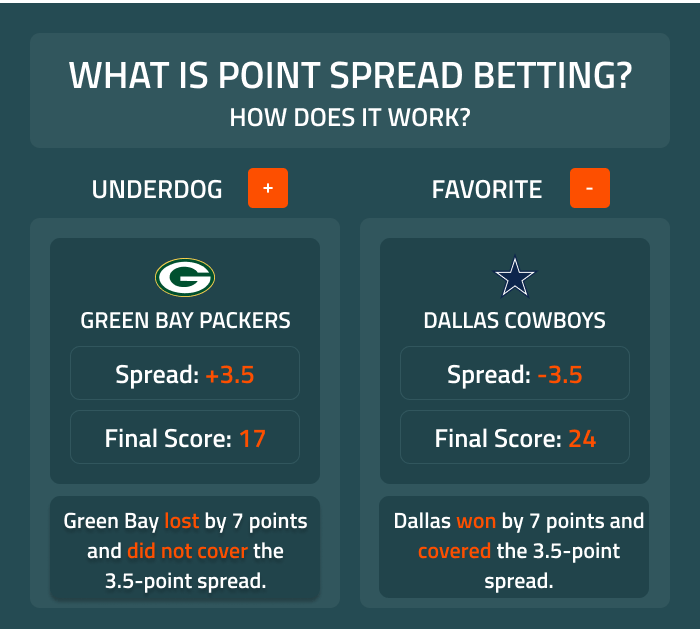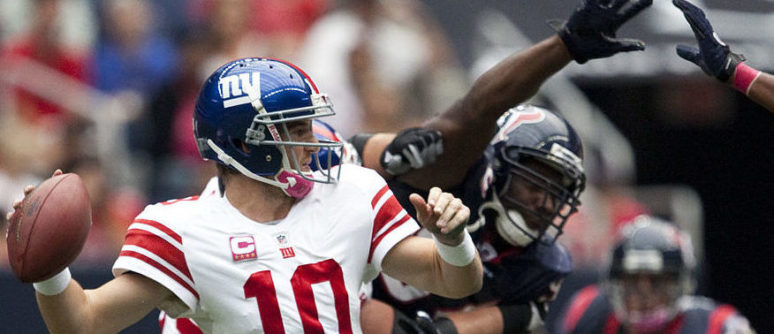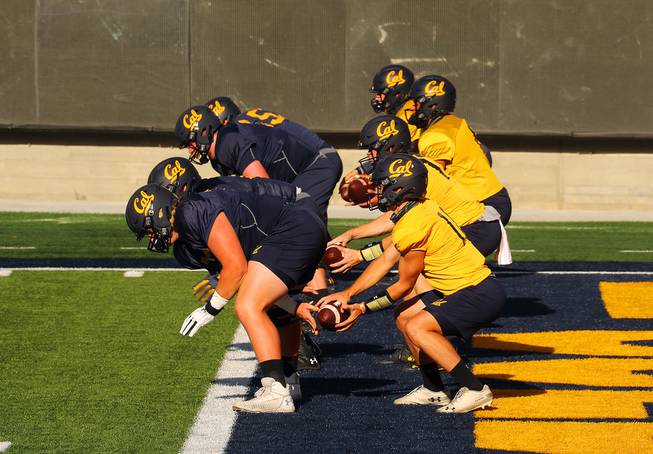Football Spread Meaning
- Nfl Football Spread Yahoo
- How To Read Point Spread
- Football Spread Meaning Vs
- Football Spread Wiki
- Football Spread Meaning
Betting the spread is obviously more difficult than just picking moneyline winners, but the odds on point spread bets are often -110 or -105, meaning your odds greatly improve if you can correctly pick ATS. Betting against the spread in football also means being aware of “football.
- Odds expressed in terms of money, with $100 being the standard. If the odds are minus (–), then that amount of money must be wagered to win $100. –150 means you must bet $150 to win $100.).
- Knowing the point spread and money line will allow you to do that. Key Points About Football and Basketball Betting Odds. With money lines, the $100 reference point doesn’t mean you have to either bet $100 or enough to win $100 You can wager whatever amount you want and the odds would just break down proportionately.
- That's the format a bookmaker will offer. No, it's not rounded. When a bookmaker offer lines like +/-4.5, it's because they want to eliminate the possibility of a void (or pushed) bet where the stake is returned to the bettor, since it's impossible to score HALF a goal.
In the NFL the best team will win the vast majority of the games. Spread betting is the most popular NFL betting option because spread betting handicaps the favourite team, which puts both teams on a more even playing field. This allows wagers on favourites to cover the spread to payout much more than money lines and also allows wagers on underdogs to have an equal chance of winning. NFL spread betting is very easy to understand and this page will explain it in detail.
In NFL spread betting the oddsmakers set a number of points that one team is favoured by in the game. This is also known as the games handicap. For a wager on the favourite to payout the favoured team must win the game by more points than the spread amount. This is known as covering the spread. For a wager on the underdog to win, the team must either win the game straight up or lose be fewer points than the spread. This is known as beating the spread. For example, if a team is favoured by 7 points, then the favourite must win by more than a touchdown to cover the spread and the underdog must either win, or lose by less than a touchdown in order to beat the spread.
| Sportsbook | Rating | Bonus | Review | Visit |
|---|---|---|---|---|
| 50% up to $1000 | ||||
| See Website for Details |

NFL Spread Betting Example
Oakland Raiders +10 (-110)
Denver Broncos -10 (-110)

In this example, the Denver Broncos are 10 point favourites over the Oakland Raiders. The (-) sign beside the spread amount indicates the favourite because they are essentially having 10 points taken away from them, while the (+) sign indicates the underdog because they are basically having 10 points added to their score.
In this example a wager on the Broncos will payout if they win by more than 10 points, while a wager on the Raiders will payout if they lose by fewer than 10 points or if they pull of the big upset and win the game outright.
Other NFL Spread Betting Information
The most common odds associated with each side of a spread bet are (-110), which means that a $110 bet would win $100. That being said it is possible for the odds to vary slightly if the spread doesn’t perfectly handicap a game. Here is an example:
Green Bay Packers -3 (-120)
Minnesota Vikings +3 (+100)
In this case the oddsmakers feel that it is more likely that the Packers will cover the 3 point spread than it is that the Vikings will beat it. In this case a $120 wager on the Packers covering the spread wins $100, while a $100 wager on the Vikings beating the spread also pays out $100.
In the two examples given in this article the spreads are whole numbers. If the game finishes with the favourite winning by exactly the spread amount then the bet is pushed and the wager is refunded. It is also possible for spreads to include half points (eg. 3.5, 7.5, etc), in which case it would not be possible for the bet to push.
Action: Having a wager on a game.
Nfl Football Spread Yahoo
ATS ('against the [point] spread'): If a team is 5-2 ATS, it means it has a 5-2 record against the point spread, or more commonly referred to simply as the 'spread.'
Backdoor cover: When a team scores points at the end of a game to cover the spread unexpectedly.
Bad beat: Losing a bet you should have won. It's especially used when the betting result is decided late in the game to change the side that covers the spread. Also used in poker, such as when a player way ahead in the expected win percentage loses on the river (last card).
Beard: Someone who places a wager for another person (aka 'runner').
Book: Short for sportsbook or bookmaker; person or establishment that takes bets from customers.
Bookie: A person who accepts bets illegally and charges vig.
Buying points: Some bookies or sportsbooks will allow customers to alter the set line and then adjust odds. For example, a bettor might decide he wants to have his team as a 3-point underdog instead of the set line of 2.5. He has then 'bought' half a point, and the odds of his bet will be changed.
Chalk: The favorite in the game. People said to be 'chalk' bettors typically bet the favorite.
Circle game: A game for which the betting limits are lowered, usually because of injuries and/or weather.
Closing line: The final line before the game or event begins.
Consensus pick: Derived from data accumulated from a variety of sportsbooks in PickCenter. The pick, and its percentage, provides insight as to what side the public is taking in a game.
Cover: The betting result on a point-spread wager. For a favorite to cover, it has to win by more than the spread; an underdog covers by winning outright or losing by less than the spread.

Dime: Jargon for a $1,000 bet. If you bet 'three dimes,' that means a $3,000 wager.
'Dog: Short for underdog.
Dollar: Jargon for a $100 bet. Usually used with bookies; if you bet 'five dollars,' that means a $500 wager.
Edge: An advantage. Sports bettors might feel they have an edge on a book if they think its lines aren't accurate.
Even money: Odds that are considered 50-50. You put up $1 to win $1.
Exotic: Any wager other than a straight bet or parlay; can also be called a 'prop' or 'proposition wager.'
Favorite: The expected straight-up winner in a game or event. Depending on the sport, the favorite will lay either odds or points. For example, in a football game, if a team is a 2.5-point favorite, it will have to win by three points or more to be an ATS winner.
Fixed: A participant in a particular game who alters the result of that game or match to a completely or partially predetermined result. The participant did not play honestly or fairly because of an undue outside influence.
Futures bet: A long-term wager that typically relates to a team's season-long success. Common futures bets include betting a team to win a championship at the outset of a season, or betting whether the team will win or lose more games than a set line at the start of the season.
Halftime bet: A bet made after the first half ended and before the second half begins (football and basketball primarily). The oddsmaker generally starts with half of the game side/total and adjusts based on what happened in the first half.
Handicapper: A person trying to predict the winners of an event.
Handle: The amount of money taken by a book on an event or the total amount of money wagered.
Hedging: Betting the opposing side of your original bet, to either ensure some profit or minimize potential loss. This is typically done with futures bets, but can also be done on individual games with halftime bets or in-game wagering.
High roller: A high-stakes gambler.
Hook: A half-point. If a team is a 7.5-point favorite, it is said to be 'laying seven and a hook.'
In-game wagering: A service offered by books in which bettors can place multiple bets in real time, as the game is occurring.

Juice: The commission the bookie or bookmaker takes. Standard is 10 percent. Also called the 'vig/vigorish.'
Layoff: Money bet by a sportsbook with another sportsbook or bookmaker to reduce that book's liability.
Limit: The maximum bet taken by a book. If a book has a $10,000 limit, it'll take that bet but the book will then decide whether it's going to adjust the line before the bettor can bet again.
Lock: A guaranteed win in the eyes of the person who made the wager.
Middle: When a line moves, a bettor can try to 'middle' a wager and win both sides with minimal risk. Suppose a bettor bets one team as a 2.5-point favorite, then the line moves to 3.5 points. She can then bet the opposite team at 3.5 and hope the favorite wins by three points. She would then win both sides of the bet.
Money line (noun), money-line (modifier): A bet in which your team only needs to win. The point spread is replaced by odds.
Mush: A bettor or gambler who is considered to be bad luck.
Nickel: Jargon for a $500 bet. Usually used with bookies; if you bet 'a nickel,' that means a $500 wager.
Oddsmaker (also linemaker): The person who sets the odds. Some people use it synonymous with 'bookmaker' and often the same person will perform the role at a given book, but it can be separate if the oddsmaker is just setting the lines for the people who will eventually book the bets.
Off the board: When a book or bookie has taken a bet down and is no longer accepting action or wagers on the game. This can happen if there is a late injury or some uncertainty regarding who will be participating.
Over/under: A term that can be used to describe the total combined points in a game (the Ravens-Steelers over/under is 40 points) or the number of games a team will win in a season (the Broncos' over/under win total is 11.5). Also used in prop bets.
Parlay: A wager in which multiple teams are bet, either against the spread or on the money line. For the wager to win (or pay out), all of them must cover/win. The more teams you bet, the greater the odds.
Pick 'em: A game with no favorite or underdog. The point spread is zero, and the winner of the game is also the spread winner.
Point spread (or just 'spread'): The number of points by which the supposed better team is favored over the underdog.

Proposition (or prop) bet: A special or exotic wager that's not normally on the betting board, such as which team will score first or how many yards a player will gain. Sometimes called a 'game within a game.' These are especially popular on major events, with the Super Bowl being the ultimate prop betting event.
Push: When a result lands on the betting number and all wagers are refunded. For example, a 3-point favorite wins by exactly three points. Return on investment (ROI): In PickCenter, ROI is the amount (according to numberFire) that a bettor should expect to get back on a spread pick.
Runner: Someone who makes bets for another person (aka 'beard').
Sharp: A professional, sophisticated sports bettor.
Spread: Short for point spread.
How To Read Point Spread
Square: A casual gambler. Someone who typically isn't using sophisticated reasoning to make a wager.
Steam: When a line is moving unusually fast. It can be a result of a group or syndicate of bettors all getting their bets in at the same time. It can also occur when a respected handicapper gives a bet his followers all jump on, or based on people reacting to news such as an injury or weather conditions.
Straight up: The expected outright winner of the money line in an event or game, not contingent on the point spread.
Teaser: Betting multiple teams and adjusting the point spread in all the games in the bettor's favor. All games have to be picked correctly to win the wager.
Total: The perceived expected point, run or goal total in a game. For example, in a football game, if the total is 41 points, bettors can bet 'over' or 'under' on that perceived total.
Football Spread Meaning Vs
Tout (service): a person (or group of people) who either sells or gives away picks on games or events.
Underdog: The team that is expected to lose straight up. You can either bet that the team will lose by less than the predicted amount (ATS), or get better than even-money odds that it will win the game outright. For example, if a team is a 2-1 underdog, you can bet $100 that the team will win. If it wins, you win $200 plus receive your original $100 wager back.
Vig/vigorish: The commission the bookie or bookmaker takes; also called the 'juice.' Standard is 10 percent.
Football Spread Wiki
Wager: A bet.
Welch: To not pay off a losing bet.
Football Spread Meaning
Wiseguy: A professional bettor. Another term for a 'sharp.'